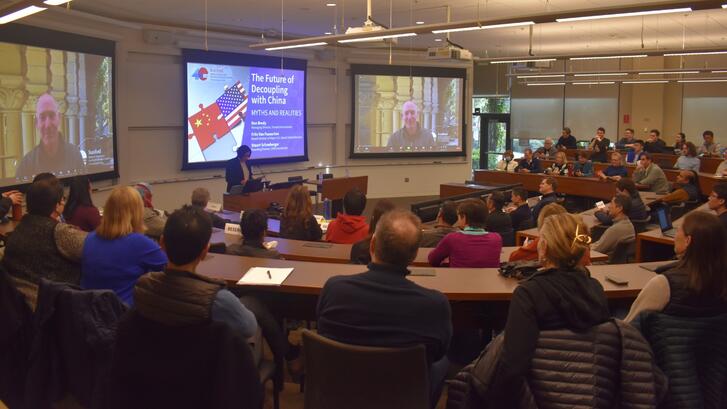The Eastern Triumvirate: How Russia, China, and North Korea Are Reshaping Global Power

A potential historic trilateral appearance by Xi Jinping, Kim Jong Un, and Vladimir Putin at Moscow's May 9 Victory Day parade would signal powerful solidarity against U.S. pressure, following the June 2024 'Comprehensive Strategic Partnership' treaty between Pyongyang and Moscow.
Join our expert panel as we analyze this unprecedented geopolitical alignment amid intensifying U.S.-China rivalry. We'll examine covert arms exchanges trading North Korean missiles for Russian defense systems, North Korean troops in Ukraine honing combat skills, and China's evolving role as it perceives American decline and builds its own alliance network.
Could this potential summit herald a new Cold War framework? We'll explore the profound implications for international relations, strategic partnerships, and regional security in what may become a defining moment in 21st-century global politics.
Speakers:

Seong-Hyon Lee is a Senior Fellow at the George H. W. Bush Foundation for U.S.-China Relations and an Associate in Research at Harvard University's Asia Center. A China scholar, Lee gained unique insights during his 11 years residing in China; after completing his Harvard degree, he worked in Beijing as a U.N. consultant and foreign correspondent before earning his Ph.D. from Tsinghua University – President Xi Jinping's alma mater – as the sole international student in his cohort. His connection to Stanford includes previously serving as the Pantech Fellow at the Shorenstein APARC following his time in China.
Lee is the author of two books on U.S.-China relations and their impact on the Korean Peninsula, with his latest publication being The New Cold War: U.S.-China Rivalry and the Future of Global Power. His research spans East Asian international relations, specializing in Chinese domestic politics and foreign policy, U.S.-China relations, North Korea, nuclear weapons, and techno-economic competition. His prior roles include serving as China Director at a Seoul-based think tank advising the South Korean government, holding an Assistant Professorship at Japan’s Kyushu University, and being a Visiting Scholar at the Harvard Fairbank Center for Chinese Studies.

Joseph Torigian is a research fellow at the Hoover Institution; an associate professor at the School of International Service at American University in Washington, DC; a Global Fellow in the History and Public Policy Program at the Wilson Center; and a Center Associate of the Lieberthal-Rogel Center for Chinese Studies at the University of Michigan.
Torigian was previously a visiting fellow at the Australian Center on China in the World at Australian National University; a Stanton Fellow at the Council on Foreign Relations; a postdoctoral fellow at the Princeton-Harvard China and the World Program; a postdoctoral (and predoctoral) fellow at Stanford’s Center for International Security and Cooperation; a predoctoral fellow at George Washington University’s Institute for Security and Conflict Studies; an IREX scholar affiliated with the Higher School of Economics in Moscow; and a Fulbright Scholar at Fudan University in Shanghai.
His book Prestige, Manipulation, and Coercion: Elite Power Struggles in the Soviet Union and China after Stalin and Mao was published in 2022 by Yale University Press. His biography on Xi Jinping’s father, The Party’s Interests Come First: The Life of Xi Zhongxun, Father of Xi Jinping, will be published in June 2025 with Stanford University Press. He studies Chinese and Russian politics and foreign policy.
Moderator:

Ria Roy is a Kleinheinz Fellow at the Hoover Institution, is a specialist in the history of modern Korea and East Asia. Her doctoral dissertation, which she is currently turning into a book, examines the intellectual and cultural history of North Korea in the context of the Japanese Empire’s legacy as well as the influence of the revolutionary bloc. In particular, she explores the history and development of the leadership succession in North Korea, focusing on the role of intellectuals and their ideas in the generation of the unique North Korean model of leadership. More broadly, she is interested in the intellectual interplay between East and West and how it paved the way for a transition to an illiberal modernity.
Roy received her PhD from the Faculty of Asian and Middle Eastern Studies at the University of Cambridge as a Gates Cambridge Scholar. She previously received her MA from Harvard University and her BA from Waseda University in Japan.
Philippines Conference Room (C330)
Encina Hall, 3rd Floor
616 Jane Stanford Way, Stanford, CA 94305

 FSI and APARC scholars meet with Yoshimasa Hayashi.
FSI and APARC scholars meet with Yoshimasa Hayashi.
































